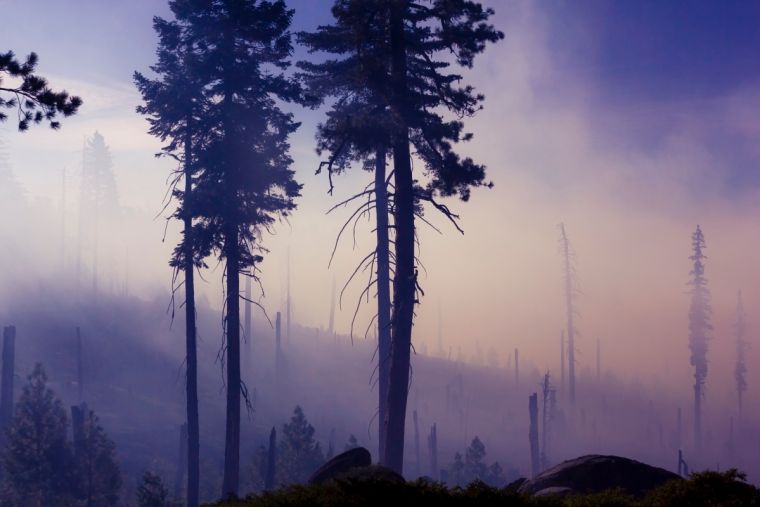Evangelical about the environment: 3 reasons Christians should prioritise creation care
Today is the World Day of Prayer for the Care of Creation in the Catholic and Orthodox churches. Pope Francis, who has made Christian concern for the environment a central theme of his pontificate, this week implored world leaders to 'listen to the cry of the Earth and the cry of the poor, who suffer most from ecological imbalances'.

But should Christians really be bothered about the environment? Some are sceptical, perhaps dismissing it as wishy-washy liberalism that's more concerned about saving the recycling than saving people's souls. Isn't the Earth going to be burned up and replaced in the end anyway?
Although its gathered steam in recent years, concern about climate change and the environment is still a divisive issue. Donald Trump's recent move to pull out of the historic Paris Climate Change Agreement shows the debate is far from over. But there are at least three reasons that Christians should take creation care seriously.
1. It's God's planet
Genesis reminds us that planet Earth is a gift to humanity – but it still belongs to the God who created it all, and to whom creation points. It's not ours to use and abuse at will, because 'Through him all things were made; without him nothing was made that has been made'(John 1:3).
The heavens declare the glory of God, and we're told that the trees will clap for joy. Jesus said that if people didn't praise him, the rocks would cry out. Creation is an animated, living witness to the goodness of God – to destroy it not only destroys God's handiwork, but kills that which is meant to give glory to him.
Much has sometimes been made of God's call for humanity to 'subdue the Earth'(Genesis 1:28), but this can't mean the brutal oppression of creation (which would be illogical) but rather the caring shaping and stewardship of it, like the great gardener who envisaged it all. We should make it more fruitful, not less.
2. Redemption is more than just you and me
Sometimes creation care falls by the wayside because believers may think 'salvation' is more important. Why fuss over carbon emissions when eternity is at stake? Why plant trees when you could be preaching the gospel? But salvation is thus envisaged in a strictly narrow sense – it's about saving my soul from hell and escaping to an other-worldly heaven. The Bible however points us to a cosmic creation, with the entire universe in the scope of salvation. Just as creation was broken in the fall, it too can be redeemed by Christ's reconciliation of 'all things, whether things on earth or things in heaven'(Colossians 1:20).
A new creation is coming, a new Heaven and a new Earth – but that doesn't mean disregarding the present creation, any more than we should disregard our present own bodies. Reveation tells us God is coming to make his home on Earth, not abolish its existence. By caring for the world around us, even saving it where we can, we look forward to its full restoration in a world free from death and dying.

3. Climate change is a killer
Man-made climate change is a killer. Carbon emissions, the desolation of forests and the melting of the ice-caps have demonstrable effects on real people's lives.
And the change can't be doubted. As Joshua Searle wrote for Christian Today: 'According to the United Nations Food and Agriculture Organization, we are losing 18 million acres of forest each year. 70 per cent of Earth's coral reefs will cease to exist within the next 40 years. The world has lost half of its coastal wetlands. Ice caps are melting and colossal sheets of ice are breaking off Greenland and Antarctica.
'Ecocide (the eradication of life from the earth) is occurring at an alarming an unprecedented rate. Species are dying out one thousand times faster than their natural rate of extinction, which means that, at the current rate, in the next 30 years, as many as one-fifth of all species alive today will have perished from the face of the earth.'
That's only a glimpse of the damage that's been done. The destruction of God's world is tragic, and it hits God's people too. Global warming causes severe droughts, floods, fires and extreme weather – all of which inevitably impact the poor the hardest.
If Christians truly care about human lives – and especially the poor and needy, as God does – then climate change should concern them deeply.
The problems are complex, and the solutions aren't always simple – combatting this man-made crisis is a challenge. But Christians don't need to choose between evangelism and environmentalism – they can do both, because the Gospel includes both.
They face a simple question when it comes to the environment – to care or not to care? As the risk of sounding like a Bible-basher, Scripture seems pretty clear on this.
You can follow @JosephHartropp on Twitter











